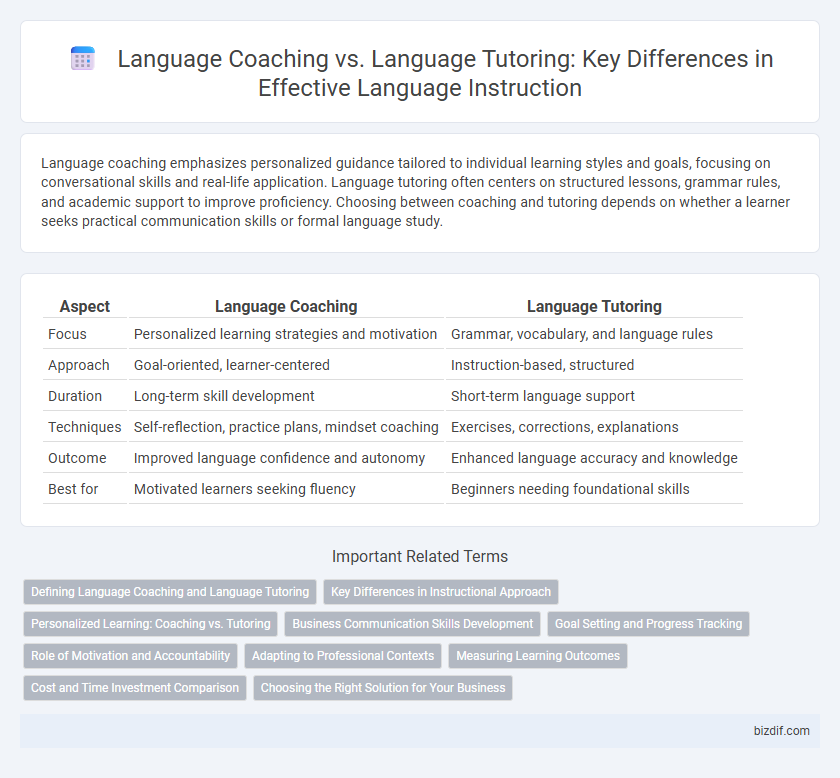Language coaching emphasizes personalized guidance tailored to individual learning styles and goals, focusing on conversational skills and real-life application. Language tutoring often centers on structured lessons, grammar rules, and academic support to improve proficiency. Choosing between coaching and tutoring depends on whether a learner seeks practical communication skills or formal language study.
Table of Comparison
| Aspect | Language Coaching | Language Tutoring |
|---|---|---|
| Focus | Personalized learning strategies and motivation | Grammar, vocabulary, and language rules |
| Approach | Goal-oriented, learner-centered | Instruction-based, structured |
| Duration | Long-term skill development | Short-term language support |
| Techniques | Self-reflection, practice plans, mindset coaching | Exercises, corrections, explanations |
| Outcome | Improved language confidence and autonomy | Enhanced language accuracy and knowledge |
| Best for | Motivated learners seeking fluency | Beginners needing foundational skills |
Defining Language Coaching and Language Tutoring
Language coaching emphasizes personalized, goal-oriented guidance to enhance communication skills and confidence in real-life contexts, often integrating cultural nuances and motivation techniques. Language tutoring typically involves structured lessons focused on grammar, vocabulary, and language rules, aimed at improving proficiency through repetitive practice and assessment. Both approaches cater to language learning but differ in methodology and learner engagement.
Key Differences in Instructional Approach
Language coaching emphasizes personalized goal setting and developing independent learning strategies, fostering long-term language acquisition. Language tutoring primarily focuses on structured lessons centered around grammar, vocabulary, and test preparation to achieve immediate academic objectives. Coaching tends to adapt to individual learner needs, while tutoring often follows a standardized curriculum.
Personalized Learning: Coaching vs. Tutoring
Language coaching emphasizes personalized learning by tailoring strategies to individual goals, strengths, and learning styles, fostering self-directed progress and long-term language mastery. Language tutoring typically focuses on specific language skills or curriculum-based content, offering direct instruction and immediate feedback to address gaps or difficulties. Coaches nurture motivation and autonomy, while tutors provide targeted guidance for structured language acquisition.
Business Communication Skills Development
Language coaching emphasizes personalized strategies to enhance Business Communication Skills Development by focusing on practical language use in professional contexts and fostering confidence in real-world interactions. Language tutoring typically concentrates on improving grammar, vocabulary, and structured language knowledge, which may not directly address situational communication challenges in business environments. Targeted language coaching leads to measurable improvements in negotiation, presentation, and intercultural communication skills crucial for effective business performance.
Goal Setting and Progress Tracking
Language coaching emphasizes personalized goal setting aligned with learners' professional or personal aspirations, fostering intrinsic motivation. Progress tracking in coaching involves continuous feedback and adaptive strategies to ensure learners meet specific milestones efficiently. Language tutoring typically centers on curriculum-based goals with periodic assessments to measure academic performance and skill acquisition.
Role of Motivation and Accountability
Language coaching emphasizes fostering intrinsic motivation and personal goal-setting, helping learners build confidence and sustain long-term engagement. Language tutoring often centers on structured lessons and correcting errors, providing external accountability through assignments and assessments. The motivational role in coaching drives proactive learning habits, whereas tutoring offers guidance and accountability to ensure consistent progress.
Adapting to Professional Contexts
Language coaching emphasizes adapting communication skills to specific professional contexts by tailoring instruction to industry jargon and workplace scenarios. Language tutors often concentrate on grammar and vocabulary fundamentals without extensive customization for career-specific language needs. This coaching approach enhances practical language application, boosting confidence and effectiveness in professional environments.
Measuring Learning Outcomes
Language coaching emphasizes personalized goal-setting and progress tracking through qualitative feedback and real-world performance assessments, enhancing learner autonomy and adaptive strategies. Language tutoring typically focuses on structured lesson plans with measurable assessment tools such as quizzes and standardized tests to evaluate linguistic proficiency and knowledge acquisition. Both approaches benefit from integrating technology-driven analytics for precise measurement of language development and learner engagement.
Cost and Time Investment Comparison
Language coaching generally involves a higher cost per session compared to language tutoring due to its personalized, goal-oriented approach that often spans several months. Time investment in language coaching tends to be more flexible, focusing on long-term fluency and practical application, while language tutoring usually requires more frequent, shorter sessions targeting specific language skills. Opting for coaching may reduce overall study time by accelerating language retention, whereas tutoring offers a cost-effective solution for focused, immediate learning needs.
Choosing the Right Solution for Your Business
Language coaching emphasizes personalized strategies to improve communication skills and cultural understanding, ideal for professionals seeking practical language use in business contexts. Language tutoring focuses on grammar, vocabulary, and exam preparation, best suited for learners targeting specific language proficiency goals. Choosing the right solution depends on your business's objectives, whether it's enhancing conversational fluency or mastering language fundamentals for certifications.
Language coaching vs Language tutoring Infographic

 bizdif.com
bizdif.com